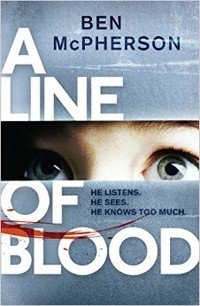
Tapping into the popularity of domestic noir thrillers, debut novelist Ben McPherson makes a brave move as a male writer dipping his toe into a mainly female market.
A Line of Blood is told entirely from a father’s point of view. Alex Mercer, his American wife Millicent, and their young son Max, seem to have a content life in Finsbury Park, North London, until one fateful day. Alex and Max go to a neighbour’s house in the search of their errant cat and discover the occupant dead in a bathtub, seemingly having comitted suicide. The ramifications of this take hold of their lives. Max has to go to a child psychologist, and Alex discovers that Millicent has spent time in the neighbour’s house without telling him. This turns his world upside down and the cracks in their marriage start to appear. Their son grows increasingly disturbed, and Alex’s own difficult upbringing begins to affect the family. Then a murder investigation begins, and Alex finds his once comfortable life unravelling around him, drawing him towards to some unwelcome home truths.
It is probably a testament to the strength of McPherson’s writing that A Line of Blood is not an easy read. It’s a miserable affair as the family descends into domestic violence, suspicion and woe. The author vividly portrays the crumbling of Alex’s world to such a degree that I needed several breathers to escape the high pressure emotion it brings out.
As the relationship between the three central characters implodes, each is revealed to be deeply unpleasant – the arrogant Alex, fickle Millicent and the intensly irritating and precocious Max. Their unholy trinity of domestic despair relents with the arrival of Millicent’s flighty and lively sister, Arla, who brings some light relief from the sadness and emotional intensity at play in this household. The book has much in common with Gone Girl, and it is hard to feel empathy or sympathise with the characters, who are quite hard to like. That’s where your interest might wane.
The detour into Alex’s family background, and his difficult relationship with his father, starts promisingly enough, but is interrupted and fractured as other events in his life interfere with this narrative strand, which seems so integral to the plot. The portrayal of the smug and touchy-feely child psychologist treating Max quickly grates as well.
The thriller aspect of the book is satisfying enough, with the murder investigation playing out and the possible involvement of members of the Mercer family pivoting to and fro. Following on the theme of dislikeable characters though, it’s soon obvious that their dead neighbour was not all that he appeared. The police characters are solid enough, but the main focus of the book is the micro-study of the Mercers, and how easily a family can be rocked to its core by one event.
The strength of A Line of Blood has to be the level of emotional intensity that McPherson retains throughout the plot. However, this can be a little overpowering and the actual murder investigation struggles to make itself heard in this maelstrom of sadness and disturbing behaviour. Undoubtedly, fans of Gone Girl and The Silent Wife will lap this up, and the quirkiness of a male author entering such an oestrogen-fuelled genre is a point of interest, but generally this tale of suburban sadness is a touch unsatisfying in its uneven execution.
HarperCollins
Print/Kindle/iBook
£6.49
CFL Rating: 3 Stars









